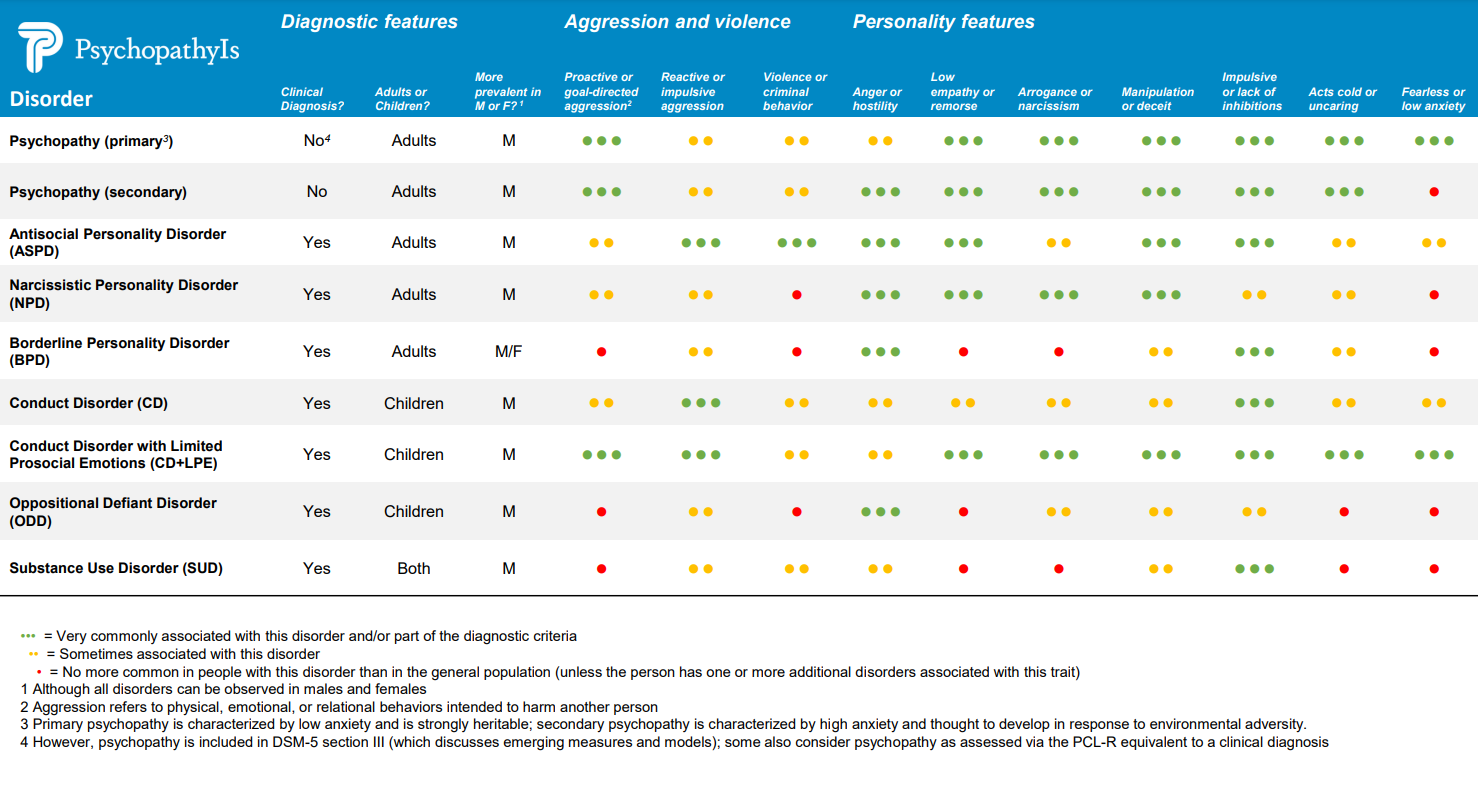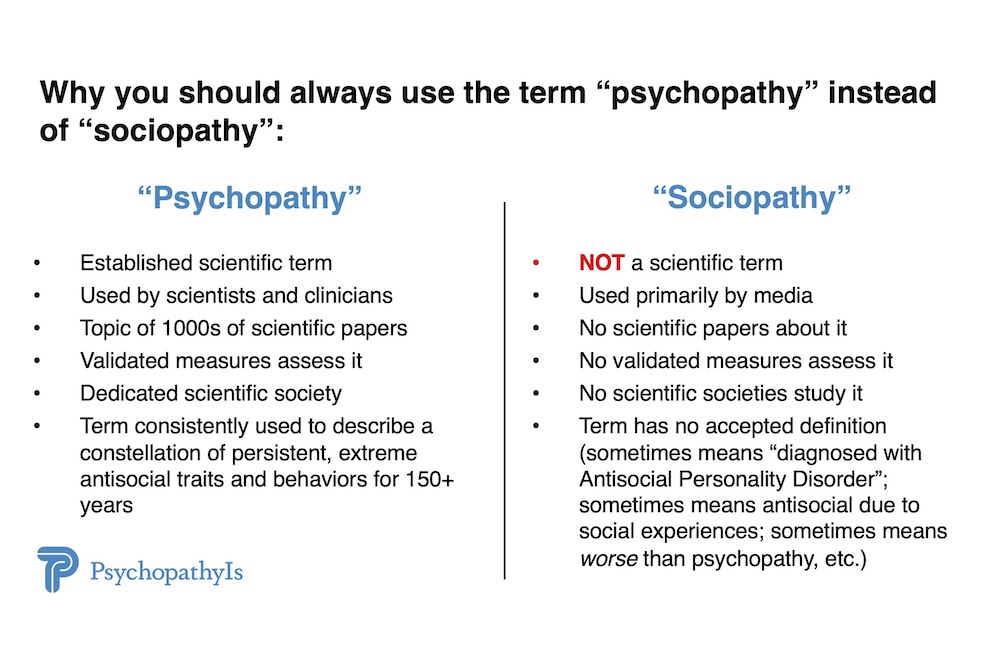Related Psychological Disorders and Diagnoses
This information should not be used to diagnose or treat. It is not meant to take the place of consultation with a healthcare professional. If you have concerns, you should contact your healthcare provider for a screening.
Psychological Disorder or Clinical Diagnosis?

Comparison of “externalizing” clinical disorders (disorders characterized by antisocial behaviors such as rule-breaking, aggression, or criminality)
Psychopathy is a scientifically recognized disorder. However, it is not a clinical diagnosis. This is because it is not listed by that name in The Diagnostic and Statistical Manual-5 (DSM-5)) or the International Statistical Classification of Diseases and Related Health Problems (ICD-10), which are the manuals that mental health professionals use to classify and diagnose mental illnesses.
Antisocial Personality Disorder (ASPD) (applicable to adults 18 and older). A consistent pattern of aggression, criminal behavior, deceit, rule-breaking, impulsiveness, and/or lack of remorse. Only a minority of those who qualify for ASPD also have psychopathy. And many people with psychopathy do not meet criteria for ASPD.
Narcissistic Personality Disorder (NPD). A consistent pattern of grandiosity, need for admiration, and lack of empathy. People with psychopathy are typically narcissistic. Thus many people with psychopathy also meet the criteria for NPD. However, not all people with NPD are psychopathic.
Attention Deficit Hyperactivity Disorder (ADHD). A consistent pattern of inattention (not being able to keep focus), hyperactivity (excess movement) and impulsivity. ADHD is relatively common, and most people with ADHD are not antisocial. However, ADHD is closely linked to an increased risk for antisociality over the lifespan. And a majority of people with psychopathy or related disorders of antisociality also meet criteria for ADHD.
Substance Use Disorders (SUD). Compulsive use of alcohol or drugs despite their harmful consequences. People with addiction (severe substance use disorder) focus on using one or more substances to the point it takes over their lives. Many people with psychopathy also have substance use disorders. Note that substance use can mimic many symptoms of psychopathy. In this case, treatment for substance use alone may improve behavior.
Conduct Disorder (CD, applicable to children under 18). A consistent pattern of aggression, destructiveness, deceit, and/or rule-breaking. Most children with CD do not have psychopathy. But children with CD who also qualify for the Limited Prosocial Emotions specifier (low empathy and remorse, an uncaring nature, and shallow emotion) are at very high risk for psychopathy.
Oppositional Defiant Disorder (ODD, applicable to children under 18). A consistent pattern of irritability, argumentativeness, and defiant and/or spiteful behavior. ODD is a developmental precursor to CD. This means a child with ODD is at higher risk for developing CD.
Other related terms and mental health conditions
Psychopathy, sociopathy, or narcissism?
Although they are not clinical diagnoses, psychopathy, sociopathy, and “malignant narcissism” are all terms that you may hear used to describe people who appear to lack empathy, guilt, and remorse and who engage in persistent antisocial behaviors. However, there are important differences among these terms.

Psychopathy
Psychopathy is the scientific term used to refer to traits that include callousness, antisociality, and disinhibition. There are two forms of psychopathy: Primary and secondary psychopathy. Primary psychopathy is thought to be strongly related to genetic risk factors. People with primary psychopathy generally show stable levels of psychopathy over long periods of time. They have low levels of anxiety and fear, and often do not have histories of severe trauma, abuse, or neglect that can explain their personality and behavior.
Secondary psychopathy is thought to result mostly from environmental factors. People with secondary psychopathy may show more changes in their personality and behavior over time (getting either worse or better). They tend to have high levels of anxiety and fear, and often have histories of severe trauma, abuse, or neglect.
Sociopathy (or Sociopath)
Sociopathy is not a clinical or scientific term. Mental health professionals do not use this term, and it is not a diagnosis. In general, “sociopath” is a term used by the media and the public to describe anyone who engages in violent or antisocial behavior. The term is sometimes used (again, by the media and the public, not by mental health professionals) to refer to people whose antisocial behavior results from trauma or abuse. Thus, its meaning tends to be closer to secondary psychopathy than primary psychopathy.
Malignant Narcissism
“Malignant narcissism” is not a clinical or scientific term, it is not a diagnosis, and there is no scale for assessing it. It is sometimes used to describe people whose extreme narcissism leads them to engage in antisocial behavior. The traits that are often used to describe malignant narcissism overlap strongly with psychopathy, however, so it may be more scientifically and clinically accurate simply to use the term psychopathy.
